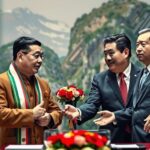Politics
AR, ARZU RANA DEUBA, ASIA, BEIJING, CHINA, COMMUNIST PARTY OF NEPAL - UNIFIED MARXIST LENINIST, CPN, CPN - UML, DIPLOMACY, FOREIGN POLICY, INDIA, INTERNATIONAL RELATIONS, KATHMANDU, KHADGA PRASAD OLI, MARXIST, NEPAL, NEW DELHI, OL, OLI, STRATEGIC PARTNERSHIP, TIBET, UNIFIED, XI
Dante Raeburn
Navigating Geopolitical Tensions: PM Oli’s Strategic Visit to China
Nepal’s Prime Minister Khadga Prasad Oli’s visit to China marked a crucial diplomatic effort to balance relationships with major neighbors amid geopolitical tensions. Key agreements included the Framework for Belt and Road Initiative Cooperation, emphasizing case-by-case project negotiations, and a commitment to enhancing bilateral connectivity through infrastructure projects. This visit serves as a strategic model for small states navigating global powers.
Nepal’s Prime Minister Khadga Prasad Oli recently concluded a significant visit to China from December 2 to 5, during which he artfully navigated complex geopolitical tensions and domestic political challenges. The visit culminated in the signing of the Framework for Belt and Road Initiative (BRI) Cooperation. This agreement enables case-by-case negotiations rather than binding Nepal to a blanket implementation plan, reflecting Nepal’s nuanced approach to its relations with both China and India.
Oli’s diplomatic strategy appears to serve as a template for how small states can balance their interests amid the competing influences of larger neighbors. The recent agreement demonstrates the importance both Nepal and China place on their bilateral relations, as evidenced by the detailed 12-point joint statement that emphasizes future cooperation. Key aspects of this cooperation include commitments to development projects that would enhance connectivity between Nepal and China while maintaining flexibility in engagement.
The joint task force, comprising representatives from both the ruling CPN-UML and the centrist Nepali Congress, reflects an effort to secure a consensus about BRI projects, given the Nepali Congress’s concerns about financing. This collaborative approach mitigates risks associated with political backlash while addressing internal economic needs.
Critical terms used in the agreements display a diplomatic sensitivity, with the Nepali side recognizing “Xizang affairs as internal affairs of China” and opposing any separatist movements. The parties also expressed interest in enhancing civil aviation and trade connections, indicating a shared vision for mutual economic benefit. While progress has been made, there remain significant challenges, particularly concerning funding and project implementation, which have previously stymied cooperation under the BRI framework.
Nepal has historically faced challenges in balancing its relationships with neighboring giants, namely China and India. With a geopolitical landscape fraught with tension, particularly concerning territorial disputes and economic partnerships, Nepal has sought to maintain its sovereignty while leveraging opportunities for development. The Belt and Road Initiative, championed by China, offers substantial infrastructure funding, though it comes with concerns regarding potential debt. Nepal’s political landscape is marked by a coalition government grappling with differing views on foreign aid and political alignments, further complicating its diplomatic posture.
Prime Minister Oli’s visit to China underscores Nepal’s strategic navigation through a complex geopolitical terrain. By signing the BRI Framework agreement, Nepal has not only reaffirmed its commitment to fostering ties with China but has also established a diplomatic roadmap characterized by flexibility and collaboration. The resulting joint task force opens avenues for future negotiations and projects, embodying a pragmatic approach that balances economic aspirations with political realities. This visit serves as a pivotal moment for Nepal in its efforts to maintain autonomy while engaging broadly with international partners.
Original Source: www.hindustantimes.com








Post Comment